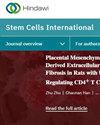TLR3 Agonist Amplifies the Anti-Inflammatory Potency of ADSCs via IL-10-Mediated Macrophage Polarization in Acute Pancreatitis
IF 3.3
3区 医学
Q2 CELL & TISSUE ENGINEERING
引用次数: 0
Abstract
The immunoregulatory role of mesenchymal stem cells (MSCs) in inflammation is heterogeneous and can exhibit anti-inflammatory or proinflammatory properties depending on the microenvironment. We herein observed that the activation of Toll-like receptor 3 (TLR3) by polyinosinic : polycytidylic acid (poly(I : C)) stimulation facilitated the transformation of adipose-derived stem cells (ADSCs) into an anti-inflammatory phenotype. The enhanced anti-inflammatory properties were assessed in a taurocholate-induced pancreatitis model. The results demonstrated that poly(I : C) pretreated ADSCs exhibited enhanced anti-inflammatory properties than untreated ADSCs in taurocholate-induced pancreatitis. Mechanistically, poly(I : C)-treated ADSCs showed increased production and secretion of interleukin-10 (IL-10), which demonstrates a potent ability to alleviate inflammatory signaling cascades in acinar cells. Simultaneously, the heightened anti-inflammatory effects of poly(I : C)-treated ADSCs in pancreatitis were associated with the regulation of macrophage classical/alternative transformation, thereby mitigating inflammatory factor-mediated damage to the pancreatic acinar cell. We propose that TLR3 activation by poly(I : C) is an effective strategy to enhance the anti-inflammatory properties of MSCs, which offers a valuable consideration for improving the therapeutic efficacy of MSCs in inflammatory diseases.TLR3激动剂通过IL-10介导的巨噬细胞极化增强急性胰腺炎 ADSCs 的抗炎能力
间充质干细胞(MSCs)在炎症中的免疫调节作用是多方面的,根据微环境的不同可表现出抗炎或促炎特性。我们在此观察到,多聚肌苷酸:多聚胞苷酸(poly(I : C))刺激激活了Toll样受体3(TLR3),促进了脂肪来源干细胞(ADSCs)向抗炎表型转化。在牛胆酸诱导的胰腺炎模型中对增强的抗炎特性进行了评估。结果表明,与未经处理的 ADSCs 相比,经 poly(I : C) 预处理的 ADSCs 在牛磺胆酸盐诱导的胰腺炎中表现出更强的抗炎特性。从机理上讲,经聚(I : C)处理的 ADSCs 能产生和分泌更多的白细胞介素-10 (IL-10),这表明 ADSCs 具有缓解胰腺细胞炎症信号级联的强大能力。同时,经聚(I : C)处理的 ADSCs 在胰腺炎中的抗炎作用的增强与巨噬细胞经典/替代转化的调节有关,从而减轻了炎症因子介导的对胰腺尖叶细胞的损伤。我们认为,多聚(I : C)激活TLR3是增强间充质干细胞抗炎特性的有效策略,这为提高间充质干细胞治疗炎症性疾病的疗效提供了有价值的考虑。
本文章由计算机程序翻译,如有差异,请以英文原文为准。
求助全文
约1分钟内获得全文
求助全文
来源期刊

Stem Cells International
CELL & TISSUE ENGINEERING-
CiteScore
8.10
自引率
2.30%
发文量
188
审稿时长
18 weeks
期刊介绍:
Stem Cells International is a peer-reviewed, Open Access journal that publishes original research articles, review articles, and clinical studies in all areas of stem cell biology and applications. The journal will consider basic, translational, and clinical research, including animal models and clinical trials.
Topics covered include, but are not limited to: embryonic stem cells; induced pluripotent stem cells; tissue-specific stem cells; stem cell differentiation; genetics and epigenetics; cancer stem cells; stem cell technologies; ethical, legal, and social issues.
 求助内容:
求助内容: 应助结果提醒方式:
应助结果提醒方式:


